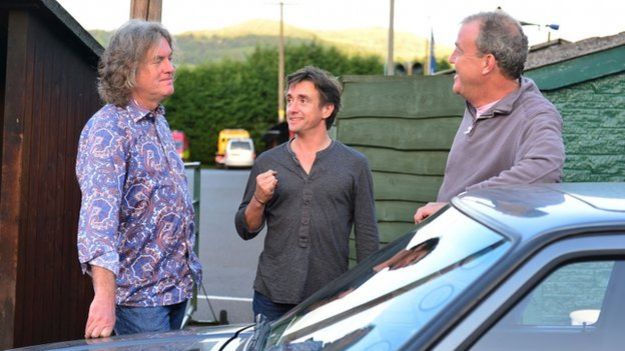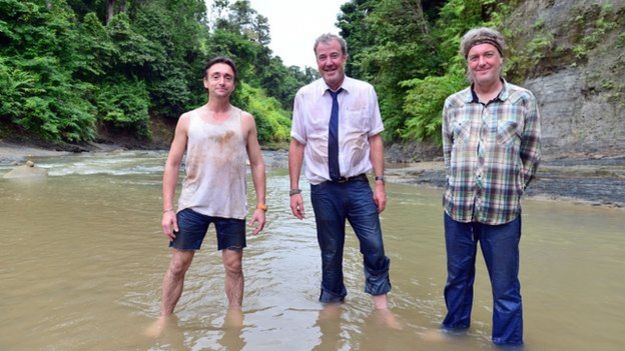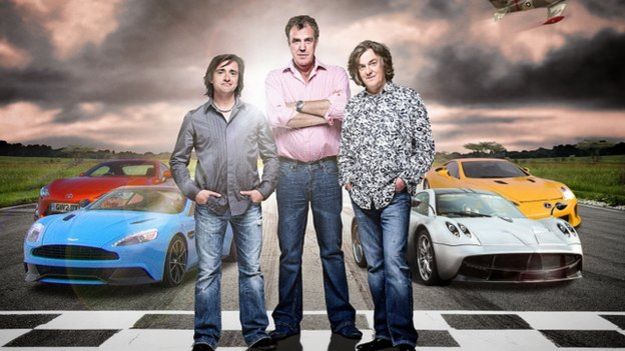Post by RedMoon11 on Apr 17, 2014 12:52:10 GMT
Richard Hammond: We Won't Run Out Of Top Gear Ideas

Richard Hammond said he cannot see Top Gear coming to an end anytime soon and the team still have plenty of ideas.
"We enjoy making it more now than before and we're all very old. We love doing it so we'll keep making it," he said.
The presenter also said that industry developments such as the electric car are not a worry and have given them an opportunity to "evolve" the show.
He added: "Cars aren't going to go away as something that people aspire to."

The show was relaunched by the BBC with Jeremy Clarkson in 2002, which is when Hammond joined as a presenter. James May started on the show a year later.
"Top Gear's got bigger and bigger over the years and it continually surprises us," he said.
"We set out to make the best and most entertaining car journey that we could. That's all we set out to do and that's still all we set out to do.
"It's just that it got really big and it surprises us every day."
The team have produced a number of specials, driving cars through countries including India, Botswana and the US.

Their most recent trip was to Burma, where they were challenged to construct a bridge over the River Kwai.
"Whenever we travel anywhere, there's a lot of planning, a lot of people involved in making sure we'll be safe and we'll probably get to where we're trying to go," said Hammond.
"When we go and we're travelling, we're meeting people as they really are, doing their job for real, living their lives for real. It's a fascinating insight into people's lives."
Currently Hammond is presenting Science of Stupid on National Geographic.
The show features clips of people attempting to do "stupid" things, which then go awry.
"I then pop up and explain the science of why it went wrong," Hammond explained.

Although he fronts this and a number of other programmes, the 44-year-old confirmed he is still passionate about Top Gear and cars.
"It's never going to go away, it'll change and evolve as a subject," he said.
"For as long as we're allowed we'll be there to continue to reflect upon it in a meaningful and intellectually driven fashion, whilst messing about."
www.bbc.co.uk/newsbeat/27054698

Richard Hammond said he cannot see Top Gear coming to an end anytime soon and the team still have plenty of ideas.
"We enjoy making it more now than before and we're all very old. We love doing it so we'll keep making it," he said.
The presenter also said that industry developments such as the electric car are not a worry and have given them an opportunity to "evolve" the show.
He added: "Cars aren't going to go away as something that people aspire to."

The show was relaunched by the BBC with Jeremy Clarkson in 2002, which is when Hammond joined as a presenter. James May started on the show a year later.
"Top Gear's got bigger and bigger over the years and it continually surprises us," he said.
"We set out to make the best and most entertaining car journey that we could. That's all we set out to do and that's still all we set out to do.
"It's just that it got really big and it surprises us every day."
The team have produced a number of specials, driving cars through countries including India, Botswana and the US.

Their most recent trip was to Burma, where they were challenged to construct a bridge over the River Kwai.
"Whenever we travel anywhere, there's a lot of planning, a lot of people involved in making sure we'll be safe and we'll probably get to where we're trying to go," said Hammond.
"When we go and we're travelling, we're meeting people as they really are, doing their job for real, living their lives for real. It's a fascinating insight into people's lives."
Currently Hammond is presenting Science of Stupid on National Geographic.
The show features clips of people attempting to do "stupid" things, which then go awry.
"I then pop up and explain the science of why it went wrong," Hammond explained.

Although he fronts this and a number of other programmes, the 44-year-old confirmed he is still passionate about Top Gear and cars.
"It's never going to go away, it'll change and evolve as a subject," he said.
"For as long as we're allowed we'll be there to continue to reflect upon it in a meaningful and intellectually driven fashion, whilst messing about."
www.bbc.co.uk/newsbeat/27054698




